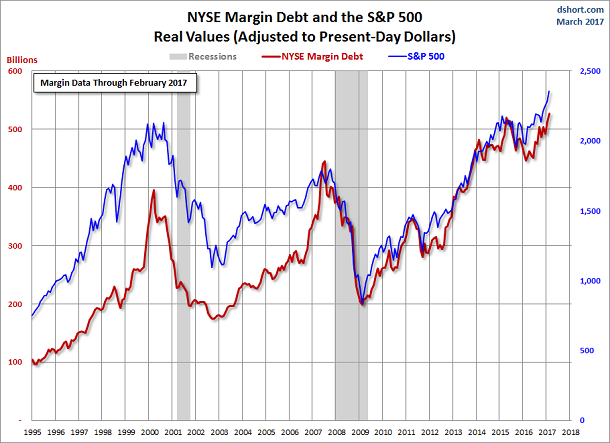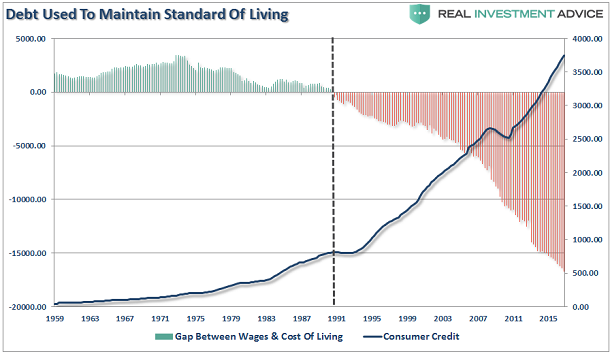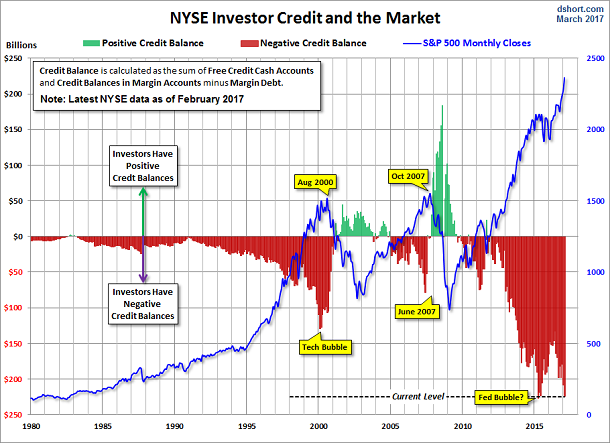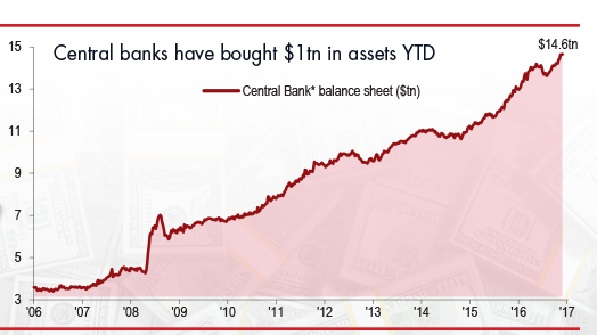There is an eight foot broadleaf evergreen directly outside my office door. Normally, I would not give it a second’s glance. Recently, however, a hummingbird has been buzzing about the greenery. And with good reason. Two hatchlings have arrived, requiring food as well as warmth.
In spite of my presence, the mother has been expressing an unusual amount of audacity. She does not flinch when I walk near the nest. And when she’s out gathering insects to feed her young, she returns to the shrub as if she owns it. My colleague Rob jokingly suggested that we name the siblings “Irrational” and “Exuberance.”
The investing public is confident alright. There’s no doubt about that. There has never been as much leverage in the market-based financial system as there is right now.
Consider margin debt. It is hitting all-time records alongside the major stock market averages. And while there’s no sure-fire way to determine when stock market ascension or brokerage account borrowing will subside, skyrocketing leverage tends to peak at exceptionally inconvenient moments; that is, when the act of borrowing to buy stocks swan dives, bubbly stock prices typically head south for the winter, spring, summer and/or fall.

Take a look at the chart above. Leverage as seen in the red line surged in 1999, only to abruptly reverse course by March of 2000. The tech bubble popped in March of 2000. (Note: The S&P 500 hung in there until August of 2000 before giving way to a two-year, six month price evisceration. Similarly, as measured by margin debt increases, investor enthusiasm catapulted higher in 2006. By mid-2007, though, leverage made a hasty retreat. And by October of 2007, stocks cratered. They reached unimaginable lows nineteen harrowing months later.
Some strategists argue that there is nothing irrational or overly exuberant about borrowing the most that one can from his/her brokerage account. He/she can buy stocks, finance a trip around the globe or even come up with more money for a real estate acquisition. And at these ultra-low interest rates, why not?
Here’s the problem: When stocks reverse direction, clients receive a “margin call.” Either they come up with cash to replenish margin account requirements or they must liquidate holdings. Obviously, they do not have the cash available, between their obligations to mortgages, auto leases and student loans. Not only is household debt-to-income at an unsustainable 130%, but household savings rates at 5% are a fraction of what they were in the 1970s and 1980s.
It follows that forced portfolio liquidation contributes to falling stock prices which, in turn, breeds additional involuntary selling. In other words, while borrowing to buy stocks bolsters higher and higher stock prices for a period, it eventually contributes to a rapid-fire descent.
Debt has been the answer for households to maintain their standards of living since the early 1990s. The massive rise in household credit has leveraged families to a point of questionable return (e.g., mortgage, auto, education, revolving credit cards, etc.).

Unfortunately, that’s not the half of it. Get a gander at what one might refer to as Credit Balance. Credit Balance results from subtracting margin debt from Free Credit Cash Accounts and credit balances within margin accounts. What we see is that negative Credit Balances have never been this far out of whack. Not during the tech bubble. And not during the housing collapse. Simply stated, stock market investors are more exuberant than ever before.

Perhaps there are relatively rational reasons for investors to be exceptionally bullish. Low borrowing costs. No obvious sign of an imminent economic recession. Trump tax and regulatory reform. And most glaringly? Tens of trillions of dollars making their way into riskier assets care of globally coordinated central bank intervention.

On the flip side, the notion that there must be an easy-to-spot catalyst prior to a bearish retreat in prices is false. The Fed may have been raising rates too rapidly leading into the turn of the century. Yet there was nothing in March of 2000 that served as an immediate impetus for the tech wreck that followed.
Here’s what I do know: (1) Household debt, corporate debt, government debt and investor debt have never been as ugly as right this minute, (2) Traditional metrics have rarely pointed to more extreme valuations than what we are witnessing today, (3) Traditional metrics still matter, in spite of what Jim Cramer says, (4) Non-recession stock bears are common, as are ultra-low interest rate bears, meaning neither an expanding economy nor a low rate environment can prevent 20% price declines, and (5) Deficit-mindful Republicans are not inclined to rubber stamp a tax package that increases the national debt, let alone a package that seems to favor the wealthiest among us.
As long as valuations and leverage levels push the upper limits of greed, I will continue to maintain a more modest allocation to equity. Stock allocation for my moderate growth-and-income clients rests at 50%; cash and cash equivalents sit closer to 25% for the ability to acquire assets at more attractive price levels.
Is there anything that I would buy in the current environment? I am partial to a few individual companies like Gilead Sciences Inc (NASDAQ:GILD). In contrast, it is exceptionally challenging to add to exchange-traded stock index funds (ETFs) when few, if any, register as bargains. I crave the ability to buy lower when the crowd is petrified of its own silhouette.
Disclosure Statement: ETF Expert is a web log (“blog”) that makes the world of ETFs easier to understand. Gary Gordon, MS, CFP is the president of Pacific Park Financial, Inc., a Registered Investment Adviser with the SEC. Gary Gordon, Pacific Park Financial, Inc., and/or its clients may hold positions in the ETFs, mutual funds, and/or any investment asset mentioned above. The commentary does not constitute individualized investment advice. The opinions offered herein are not personalized recommendations to buy, sell or hold securities. At times, issuers of exchange-traded products compensate Pacific Park Financial, Inc. or its subsidiaries for advertising at the ETF Expert website. ETF Expert content is created independently of any advertising relationship.
